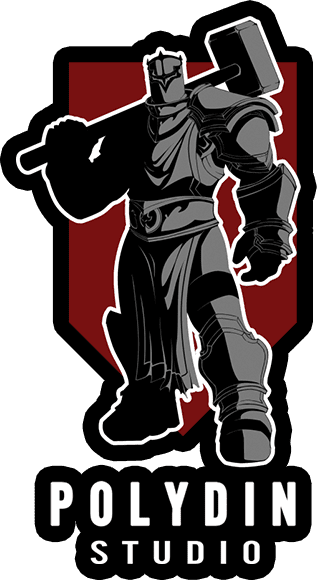You must have seen the recent protest against AI art on ArtStation. Have you heard of the Luddites? They were a group of English textile workers in the 19th century who destroyed textile machinery because they believed these pesky little machines would take their job away. As they say, history doesn’t repeat itself but often rhymes. Thanks to AI, the Luddite movement is back again, but there’s nothing to destroy now. You are dealing with an all-knowing, all-consuming digital god.
The protests started with truck drivers concerned that self-driving trucks would put them out of work. But recently, the threat of AI has moved beyond manual labor and is now threatening art and writing, things that are so human we never thought AI could threaten for real.
The reaction to AI in the art community is like that famous Gandhi quote: “First they ignore you, then they laugh at you, then they fight you, then you win.” No one was talking shit about AI art when it looked like this back in 2017:
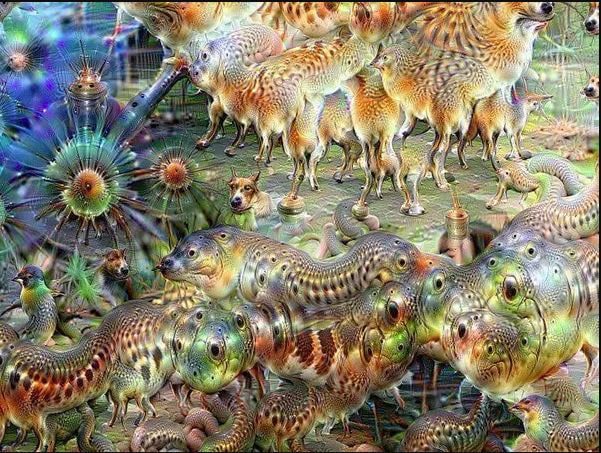

People were sharing this stuff and laughing about how they looked like Google’s nightmares. But now that AI art looks like this:
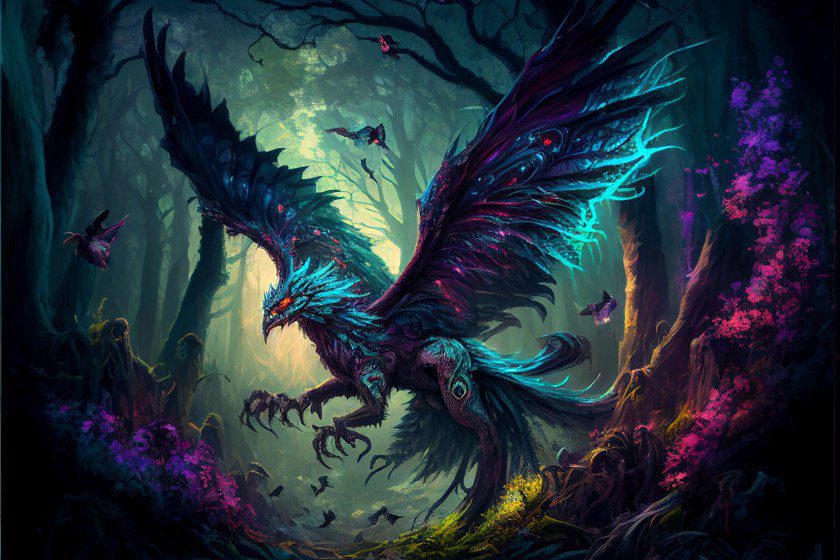

No one is laughing. Now, we’re at the “then, they fight you” stage.
Recently, there was a massive protest against AI art in ArtStation. The main page of the website was spammed with “No to AI generated Images” slogans:
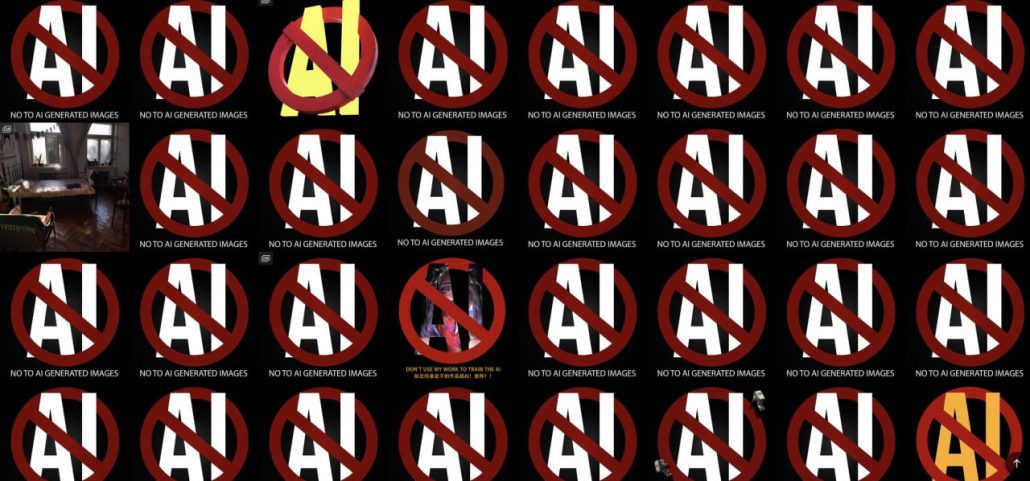

The main concern was that AI art is against copyright laws that it’s trying to steal the hard work of real artists and produce an elaborate Frankenstein monster – although beautiful – of artworks that already exist.
Artstation was quick to respond. They published a statement saying they will add a “NoAI” tag to the website. If you add it to your art, no AI will be allowed to “collect, aggregate, mine, scrape, or otherwise use” it in any way.
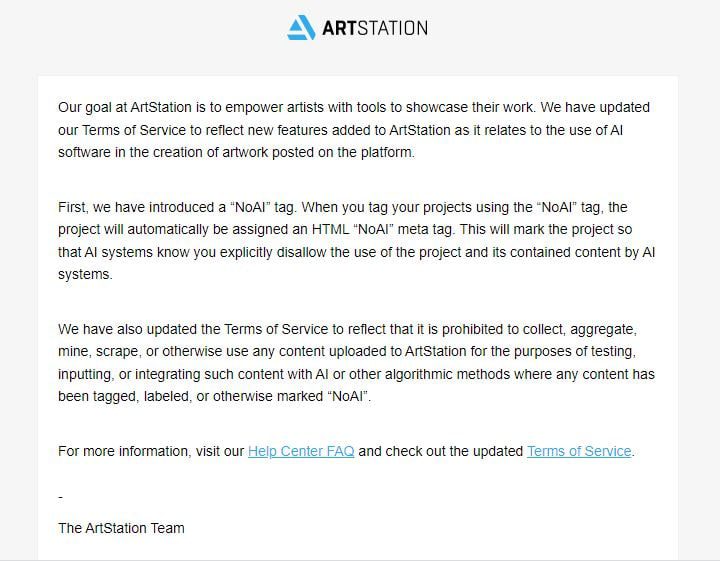

This statement is not as considerate as it seems. This is basically what ArtStation is saying: “This train is going to the top of mount glory. It’s not going to stop, but you can get off.”
I understand that copyright is a huge issue here, and the way AI art functions is a bit shady. But let’s not deceive ourselves. The main concern here is not copyright; it’s the fear of getting replaced. Nobody cared about copyright when AI art was terrible. Also, as the ArtStation solution shows, AI can be limited to a collection of legally acquired art rather than the whole internet. That can slow its progress, but it will not stop it. Something tells me that even if the copyright issue is resolved, some artists will not suddenly embrace AI.
So the million-dollar question is: is AI art going to put artists out of work? The answer is both yes and no.
AI will replace artists whose work looks like uninspired AI art already. This is a good thing. I’m sure many people who are drawing anime girls for the countless Hentai games released on Steam every year are looking for someone to save them from themselves.
If copyright doesn’t become a problem, there’s no incentive to hire an artist and pay them money so they can draw an elven forest or a cyberpunk assassin from scratch unless you want to use their celebrity status. But you can’t become a celebrity artist by designing uninspired art in the first place. So there’s that.
Midjourney – the most impressive AI tool currently exists – has some paid plans; among the features they provide is privatizing images. So, for a small fee, you can create many high-quality artwork that no one can see but yourself. Designing that phoenix picture above could take days for a human artist; Midjourney did it in a minute. No artist stands a chance against that.
However, in its current state, AI cannot give you precisely what you have in mind, but it can provide a rough sketch. So, it’s possible that in the future, companies will still need artists to experiment with the AI image and revise, reinterpret or redesign it. It’s just that the necessity for designing concept art from scratch would become much less. So, it might make one aspect of your job obsolete but add a whole new aspect to it.
Having that in mind, I don’t think anyone has ever said: “I’m going to become an artist to make shit tons of money.” Art has always been a means of passion for humans to express themselves. But the entertainment industry and its algorithmic nature somehow killed that drive for many artists. An artist working on a big game, movie, or advertisement would probably not feel this is an outlet for self-expression or creativity.
One good aspect of AI art is that it can already provide companies with mainstream algorithm-friendly art that they need and liberate artists from doing grunt work. Some artists naturally feel threatened by this because as much as they might hate doing it, this grunt work is putting food on their table.
But as one door closes, another one opens. AI art might decrease the value of average mainstream art, but it will significantly increase the value of unique perspectives and styles that human artists can provide. In other words, AI will somehow force human artists to become bolder, more creative, and more unique. AI will encourage artists to become visionaries.
In an AI-saturated world, studios could already produce functional and quick art for whatever they’re making; but the market and society will always yearn for that human touch. “A game purely made by AI art” doesn’t sound like a good slogan on a billboard, even if it does look gorgeous.
So instead of sticking to tried and tested visual styles that make many games of the same genre look too similar – like AI already designs them – gaming companies would encourage their artists to develop more unique styles which don’t look AI-produced. Through this process, artists’ skills and vision will vastly improve. Besides that, AI can be used as a helpful tool for experimentation and reiteration, saving much time.
I imagine the role of AI for artists would be similar to that of chess engines for professional chess players. Even the best chess player in the world does not stand a chance against solid chess engines, but no one has lost interest in following human chess tournaments just because AI can do it better. On the contrary, AI helped humans improve at chess on average and play more exciting and instructive games.
Another point worth mentioning is that quality does not necessarily translate to interest in art and literature. When someone buys the autobiography of their favorite celebrity, they’re not assuming that this is the best piece of literature they can get. They know that classic literature is technically more high-quality and thought-provoking. Still, they’re simply interested in the thoughts of their favorite celebrity, even if they are a cuckoo head and they know it.
The same goes for art. No matter how good AI art gets, there will always be interest in human art because we’re simply interested in exploring other people’s individuality, even if it’s flawed, amateurish, and weird. The reason is that’s what we relate to. It’s part of our empathy and one of the reasons we engage with art. AI can encourage more artists to be truly artistic by taking care of mass-produced neat-looking art.
As you can see, the advent of AI art is a win-win scenario. In the best-case scenario, it can make your job as an artist easier and help you design better pieces. In the worst-case scenario, it’ll liberate you from grunt work and encourage you to be more visionary and unique. I know some of you might think: “it’s easy for you to say that.
You’re not an overworked, underpaid artist who has to live paycheck to paycheck”, but I can assure you: if AI writing advances to a level that can write an article like this, I would say the same things to myself: it’s either going to make my job easier, or it’s going to force me to become more of a visionary. Either way, I win.
Unless AI actually does put me out of my writing job permanently, with no silver lining, in which case, I apologize to you for not standing against the digital god firmly when I had the chance.
First, they came for the truck drivers, and I did not speak out—
Because I was not a truck driver.
Then they came for the artists…
You know how this goes.

